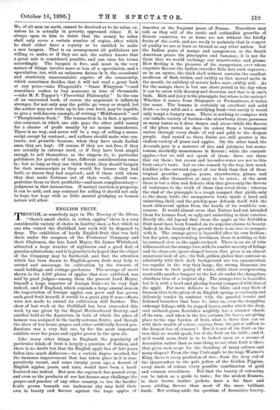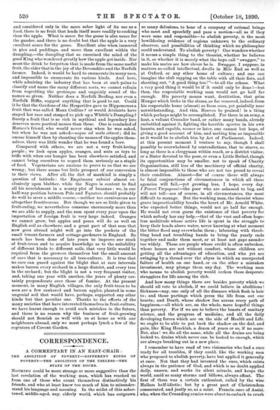ENGLISH FRUIT.
THOUGH, as somebody says in The Taming of the Shrew,
"there's small choice in rotten apples," there is a very considerable variety of choice in healthy ones, a fact which no one who visited the Guildhall last week will be disposed to deny. The exhibition of hardy English fruit that was held there under the auspices of the Fruiterers' Company and their Chairman, the late Lord Mayor, Sir James Whitehead, attracted a large number of sightseers and a good deal of genuine admiration; and it is greatly to be hoped that the object of the Company may be furthered, and that the attention which has been drawn to English-grown fruit may help to extend and encourage its cultivation by the tenants of small holdings and cottage-gardeners. The average of merit shown in the 4,500 plates of apples that were exhibited, was said by good judges—among them the present Lord Mayor, himself a large importer of foreign fruit—to be very high indeed ; and if England, which expends a large annual sum on the importation of foreign apples, can grow and has grown such good fruit herself, it would be a great pity if some efforts were not made to extend its cultivation still further. The show of last week at the Guildhall has been succeeded this week by one given by the Royal Horticultural Society, and another held at the Aquarium, in both of which the place of honour was assigned to the hardy autumn fruits ; and though the show of hot-house grapes and other artificially forced pro- ductions was a very fair one, by far the most important exhibits were the pears and apples grown in the open air.
Like many other things in England, the popularity of particular kinds of fruit is largely a question of fashion, and there is no doubt but that the English apple has of late years fallen into much disfavour,—to a certain degree merited, for the immense improvement that has taken place in it is com- paratively recent, and some twenty years ago, a dessert of English apples, pears, and nuts, would have been a hard- featured one indeed. But now the reproach has passed away, and even as the products of our hot-houses may challenge the grapes and peaches of any other country, so too the hardier fruits grown beneath our inclement sky may hold their own in beauty and flavour against the huge apples of America or the fragrant pears of France. Travellers may talk as they will of the exotic and outlandish growths of distant countries, we at home are not without the kindly fruits of the earth, and are ready to maintain that in respect of quality we are at least as blessed as any other nation. Let the Indian prate of mango and mangosteen, or the South American praise his pineapples and bananas ; it is not for them that we would exchange our strawberries and plums. How fleeting is the pleasure of the mangosteen, over whose exquisite flavour the Indian traveller falls into such raptures ; as in an oyster, the thick shell without contains the smallest modicum of flesh within, and swiftly as that morsel melts in the mouth, its subtlety of savour fades more swiftly still. As for the mango, there is but one short period in the day when it can be eaten with decency and decorum, and that is in one's bath. Rich and juicy is the pineapple, but where is its variety P Whether it comes from Singapore or Pernambuco, it tastes the same. The banana is certainly an excellent and solid fruit—a very solid and a satisfying food—but surely it would only tempt a hungry man. There is nothing to compare with our infinite variety of berries—the strawberry alone possesses as many tastes as it does shapes and sizes—while the flavour of the plum varies as does its colour from a transparent amber, through every shade of red and gold, to the deepest purple. And varied as these fruits are, still greater is the endless variety of pears and apples. On the other hand, the Avocado pear is a monster of size and juiciness, but mono- tonous, decidedly monotonous in flavour ; while the custard- apples,—but we will not speak of them : there are those that eat them ; but cream and lavender-water are not to this fruit-eater's taste. Let us also remark by the way, how much kindlier is the outward aspect of our fruit than that of these tropical growths : apples, pears, strawberries, plums, and peaches offer themselves at once to be eaten ; at the most there is but a thin and delicate skin that gives only the flavour of resistance to the teeth of those that covet them : whereas the rind of the pineapple is a rough rampart that yields only to the sharp knife, the mangosteen lurks inside a hard and uninviting shell, and the prickly-pear defends itself with the most abhorrent spikes from the hands of its would-be con- sumers. It would almost seem that Nature had not intended them for human food, so ugly and uninviting is their exterior. Surely the old legend that chose the apple as the forbidden fruit must have been founded on its superior claims to beauty. Indeed, in the beauty of its growth there is no tree to compare with it. The orange-grove is beautiful after its own fashion; but for quiet, unpretending loveliness, there is nothing so fair to outward view as the apple-orchard. There is an air of trim tidiness about the orange-tree, with its sombre severity of foliage and its clean-cut, spear-shaped leaves, that gives it an almost unnatural look of art ; the full, golden globes that contrast so admirably with their dark background are too symmetrical, too regular in the way they hang ; the strong blossoms are too waxen in their purity of white, while their overpowering scent adds another languor to the hot air under the changeless, cloudless blue of a tropical sky. The orange-tree is beautiful, but it is with a bard and glaring beauty compared with that of the apple. Far more delicate is the white and rosy flush of blossom that is the glory of an English spring, so curiously and delicately tender in contrast with the gnarled trunks and lichened branches that bear it ; later on, even the straggling unkempt foliage, with its ragged leaves, under which the deep, cool orchard-grass flourishes mightily, has a summer charm of its own ; and when in the late autumn the leaves are giving place to the ripe burden of fruit, what is there that can vie with their wealth of colour, varying from the palest saffron to the deepest hue of crimson ? But it is not of the fruit on the tree that we would speak, but of the fruit on the table ; and if, as it would seem, fruit is to be looked upon as a means of decoration rather than as something to eat, what fruit is there that gives such scope for the blending of many colours and many shapes? From the tiny Crab-apple to the huge Warner's King, there is every gradation of size ; from the deep red of the Quarrenders to the pale yellow of the Golden Pippins, every shade of colour, every possible combination of gold and crimson streakiness. Not that the beauty of colouring can be taken as a guide to taste ; for the modest Russets, in their brown leather jackets, have a far finer and more abiding flavour than most of the more brilliant kinds. But setting aside the question of decorative beauty,
and considered only in the more sober light of its use as a food, there is no fruit that lends itself more readily to cooking than the apple. What is sauce for the goose is also sauce for the gander, and there is no doubt but that the apple is a very excellent sauce for the goose. Excellent also when immured in pies and puddings, and more than excellent within the dumpling,—the dumpling that so exercised the mind of the good King who wondered greatly how the apple got inside. Nor must the drink be forgotten that is made from the same useful fruit, the cider that is the joy of the Devonshire and the Norfolk farmer. Indeed, it would be hard to enumerate its many uses, and impossible to enumerate its various kinds. And here, while admiring the industry that has been at such pains to classify and name the many different sorts, we cannot refrain from regretting the grotesque and ungainly sound of the names so given. Neither does a Norfolk Beefing, nor even a Norfolk Biffin, suggest anything that is good to eat. Could it be that the Gardens of the Hesperides gave to Hippomenes a fruit that was called Manx Codlins ? or would Atalanta have stayed her race and stooped to pick up a Whittle's Dumpling ? Surely a fruit that is so rich in mythical and legendary lore deserves more poetical names than these. One is reminded of Horace's friend, who would never sing when he was asked, but when he was not asked—usque ad Imola citaret ; did he amuse himself then by chanting the names of the apples them- selves, there was little wonder that he was found a bore.
Compared with others, we are not a very fruit-loving people ; we look upon apples, oranges, and nuts as toys to trifle with when our hunger has been elsewhere satisfied, and cannot bring ourselves to regard them seriously as a staple of food. Vegetarians are anxious to prove to us that we are wrong; but there seems but little prospect of our conversion to their views. After all, the diet of mankind is simply a question of latitude : the • Esquimaux subsist almost ex- clusively upon blubber, while the Negro is content to find all his nourishment in a scanty plot of bananas : we, in our half-way position between Pole and Equator, should probably do well to steer a middle course,—neither too carnivorous nor altogether fructivorous. But though we are so little given to fruit-eating, we nevertheless consume enormously more than we are able to supply, and the sum spent every year upon the importation of foreign fruit is very large indeed. Oranges we cannot grow, but apples and pears will do as well on English soil as elsewhere, and a great part of that sum that now goes abroad might well go into the pockets of the small tenant-farmers and cottage-gardeners in England. So much has been done of late years to improve our stock of fruit-trees and to acquire knowledge as to the suitability of different kinds to different soils, that very little would be required from the growers themselves but the small amount of care that is necessary to all tree-culture. It is true that no care can guard against the blight that at rare intervals makes barren every orchard in a large district, and every tree in the orchard ; but the blight is not a very frequent visitor, and, taking one year with another, the years of plenty cer- tainly preponderate over those of famine. At the present moment, in many English villages, the only fruit-trees to be seen are a few cankered and barren apples, planted in some ungenial soil that would have, perhaps, supported any other kinds but that peculiar one. Thanks to the efforts of the many societies that have interested themselves in fruit-culture, we have learnt enough to avoid such mistakes in the future, and there is no reason why the business of fruit-growing should not flourish as well with us at home as with our neighbours abroad, only we must perhaps lynch a few of the regraters of Covent Garden.







































 Previous page
Previous page